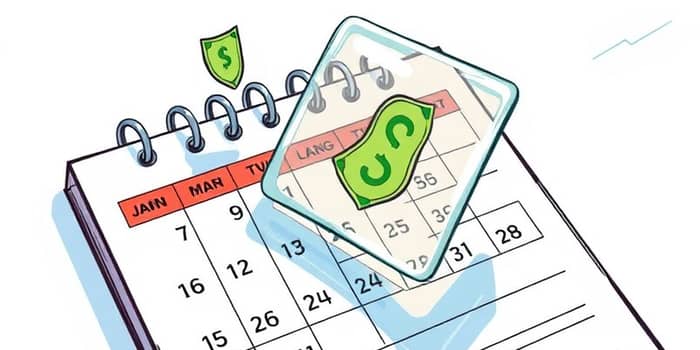When you receive a bill each month, the due date can feel like a ticking clock. But many financial products and services include a buffer called a grace period. Understanding how this works can save you money and protect your credit rating.
Definition and Basic Concept
A grace period is a defined span of time after your payment due date during which you can pay without facing penalties. This temporary financial relief window gives you breathing room to settle up.
During the grace period, you will not incur late fees or damage your credit score if you meet the payment requirement within the allowed days. However, this should not be confused with a deferment, which is a formal postponement of payment obligations under certain hardship conditions.
Typical Grace Period Durations
Grace period lengths vary widely by product type and contract terms. Here are some common examples:
- Mortgages: Often include about a 15-day grace period after each monthly due date.
- Insurance Premiums: Commonly allow 15 to 30 days to pay before coverage is canceled.
- Credit Cards: Legally require a minimum of 21 days between statement close and due date.
- Student Loans: Federal loans typically grant six months of relief after graduation.
- Auto and Personal Loans: May offer anywhere from a few days up to two weeks, depending on the lender.
How a Grace Period Works
If you pay within the grace period, you will incur no late fees, cancellation, or penalties. Your account remains in good standing, and your credit report is unaffected.
Some lenders continue accruing interest during this period, while others pause interest charges until after the grace period expires. Always review your contract to know whether interest will be added.
The terms of your grace period—its length, any interest charges, and penalties for late payment—are detailed in your account agreement. Reading the fine print helps you avoid surprises.
Credit Cards: Special Rules
Credit cards have unique grace period rules tied to the billing cycle. The time between the statement closing date and the payment due date is your window to pay off your full balance.
If you pay the full statement amount by the due date, you enjoy interest-free purchases during this period. However, if any balance carries over, you lose your grace period immediately, and interest begins accruing on new purchases from the transaction date.
Note that cash advances and balance transfers generally do not enjoy a grace period. Interest starts accruing right away for those transactions.
Real-World Examples
- Mortgage payment due on the 1st of the month with a 15-day grace period: you can pay by the 15th without penalty.
- Credit card statement closing June 1 with a June 22 payment due date: pay in full by June 22 to avoid interest.
- Federal student loan: six-month grace period after graduation before repayment begins.
What Happens After the Grace Period Ends
If you miss the end of your grace period, you may face late fees, higher interest rates, and negative marks on your credit report. Some lenders can even cancel your coverage or freeze your credit line.
For credit cards, any unpaid balance after the grace period triggers penalty rates, which can be significantly higher than the standard APR. Mortgage lenders may charge a late fee equal to a percentage of your monthly payment.
Not Universal
Grace periods are not guaranteed for all bills. Many utility companies, rent agreements, and overdraft services do not offer formal grace periods or may extend informal leeway at their discretion.
Always check with your service provider or landlord to understand whether you have any leniency and whether it is written into your contract.
Tips for Consumers
Follow these practices to make the most of grace periods and avoid penalties:
- Review your account terms to know how long your grace period lasts and any associated conditions.
- Set up automatic payments or calendar alerts to ensure you pay within the period.
- Aim to pay your full statement balance on time each cycle to maintain interest-free status on credit cards.
- Contact your lender immediately if you anticipate missing a payment—they may offer hardship options or a short extension.
Conclusion
Payment grace periods serve as a vital buffer that can keep your finances on track and protect your credit standing. By knowing your specific rights and contract terms, you can confidently manage due dates without fear of unexpected fees or penalties.
Always read your agreements, set reminders, and strive to pay in full whenever possible. Armed with this knowledge, you can navigate billing cycles with greater peace of mind and financial stability.
References
- https://www.investopedia.com/terms/g/grace_period.asp
- https://www.consumerfinance.gov/ask-cfpb/what-is-a-grace-period-for-a-credit-card-en-47/
- https://www.law.cornell.edu/wex/grace_period
- https://www.experian.com/blogs/ask-experian/what-is-a-grace-period/
- https://www.nerdwallet.com/article/credit-cards/credit-card-grace-period
- https://razorpay.com/blog/business-banking/grace-period/
- https://www.marinhhs.org/bhrs-clinical-documentation-guide










